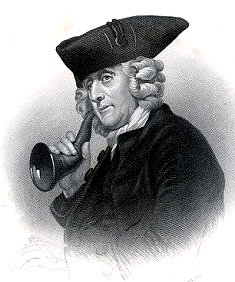Introduction
Born: September 13, 1715, London, England.
Died: May 3, 1795, Oxted Cottage (near Godstone), Surrey, England.
Buried: Moravian Burial Ground (Sharon’s Garden), Chelsea, England.

Born: September 13, 1715, London, England.
Died: May 3, 1795, Oxted Cottage (near Godstone), Surrey, England.
Buried: Moravian Burial Ground (Sharon’s Garden), Chelsea, England.

Hutton’s father, a nonjuring clergyman who had resigned his living, lived in College Street, Westminster, where he took Westminster boys to board.
James was educated at Westminster, and was apprenticed to Mr. Innys, a bookseller of St. Paul’s Churchyard. About 1736 he opened a bookshop of his own at the Bible and Sun, west of Temple Bar, but never paid much attention to business.
Before the end of his apprenticeship he had met the Wesleys at Oxford, and when they left for Georgia in 1735, he accompanied them to Gravesend. In 1738 and 1739 he published Whitefield’s Journal.
Hutton started a small prayer society in London, and corresponded with many Methodists. His mother remained a strong churchwoman, and wrote to Samuel Wesley, who was not of his brother’s way of thinking, that John Wesley was her son’s pope.
In 1737, John Wesley introduced Hutton to Peter Bohler and two other Moravian brethren then on their way to Georgia. From then on, Hutton inclined to Moravianism.
In 1739, he set out for Germany, where he visited the Moravian congregations, and began a correspondence with Count Zinzendorf. When John Wesley was separating himself from the Moravians, he vainly tried in 1739 to persuade Hutton to follow his example.
By 1740, after Wesley had induced several members of Hutton’s society, which was meeting at the Fetter Lane Chapel, to abandon it for his Foundry Society, the break between the two men was complete.
They subsequently reconciled, and Wesley noted in his journal after Hutton had paid him a visit that he believed Hutton would be saved, but as by fire.
Hutton was an active Moravian leader the rest of his life. He often visited Germany, and in 1741 became, on Spangenberg’s advice, one of the founders of the Society for the Furtherance of the Gospel, and acted as referendary
for many years.
During an interview in which the projected Moravian mission to Labrador was discussed, Lord Shelburne asked him, Pray, on what footing are you with the Methodists?
They kick us whenever they can,
answered Hutton.
George III, the Queen, and Dr. Franklin were among Hutton’s acquaintances.
Some refer to Hutton as the founder of the Moravian movement in Britain.
Hutton contributed several hymns to the 1754 Moravian Hymn Book. His other works include: